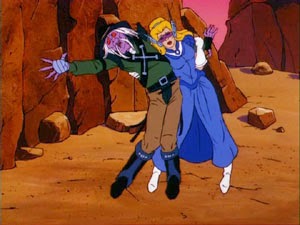In
“Eye of the Beholder,” a blind woman, Allie Kingston, arrives on New Texas with
the hope that the mineral Kerium might be utilized to help blind children on
man worlds see again.
Allie
oversees the processing and preparation of Kerium for off-planet transport, but
Tex Hex interferes, and wants the Kerium for himself. After one of his plans fails, Allie and Tex
Hex meet face-to-face. But because of
her handicap, Allie doesn’t know that she is dealing with a hardened criminal. She senses that he is a “stranger…a loner,” but not a monster.
Instead,
Tex-Hex shows Allie kindness, and recalls how he lost the love of his life over
the choices he has made. Allie assures him he is not really evil, but for Tex
Hex it may just be too late to change.
Sympathy for the
devil?
This
episode of BraveStarr is a most welcome entry in the series because it
adds some meat to Tex Hex’s skinny bones.
Thus far in the Filmation series, he has served as a kind of transparent
Skeletor stand-in, always putting up an evil plan, always getting quashed by
his nemesis, in this case, BraveStarr.
He has always seemed evil, well, just because…he’s evil.
But
in “Eye of the Beholder,” a blind woman, Allie, learns about Tex Hex, and more
than that, Tex Hex opens up about himself.
We see flashbacks from his past, including his failed relationship with
another woman. The episode ends with Tex Hex watching Allie leave the planet,
in silence. There is no guarantee that
he will change, but suddenly we feel a human connection to him that other
episodes have lacked.
The
much-appreciated message, even if not terribly subtle, is that there is good in
everybody. And more than that, people
can change, both for the worse and for the better. Tex Hex became what he is -- a thief and a
bandit -- because of his choices. If he made better choices, he could change
again.
So
many cartoon series of the 1970s and 1980s deal in absolutes, and in
two-dimensions, good and evil.
BraveStarr features its share of those episodes for certain, but “Eye of
the Beholder” is a nice change, and one that indicates a willingness on the
part of the writers to explore their world, and even the villains of that
world.
The
message at the end of the episode this week concerns treating people with
disabilities fairly, tying into Allie’s blindness. That’s a worthy cause, but it might have been
better for the episode to comment on Tex Hex, and the idea that it is always
good to have empathy or people, even people who you don’t judge as good. For with empathy, comes understanding.
Next episode: "Eyewitness"











Another episode that showed the series really needed to be unbound by the constraints of children's TV.
ReplyDelete